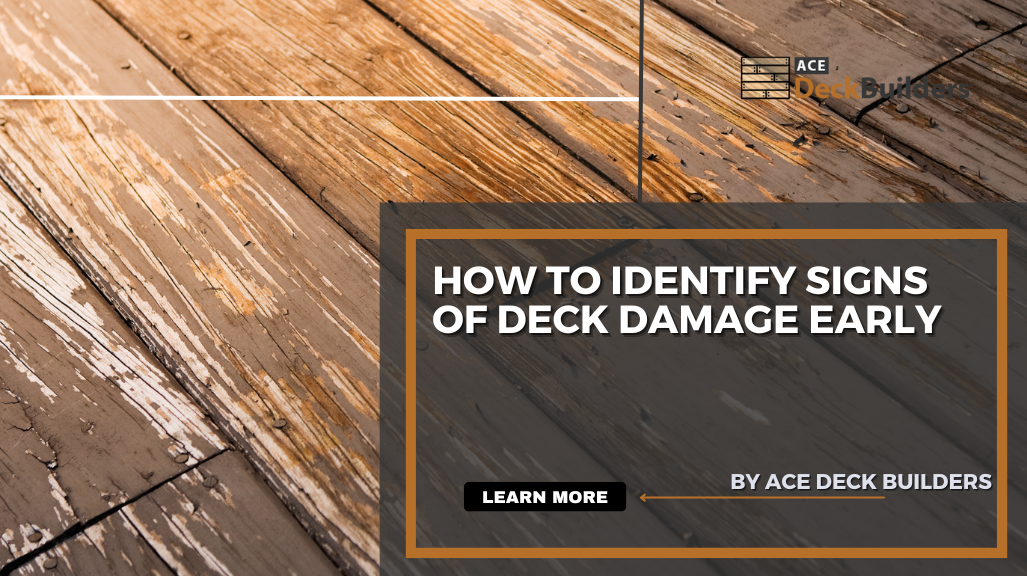
Ace Deck Builders is committed to helping homeowners protect their outdoor spaces with professional deck repair and maintenance guidance. Recognizing the early signs of deck damage is crucial in preventing costly repairs and ensuring a safe, functional outdoor space for years. Understanding the importance of quality deck construction can help identify these early signs. Neglecting these signs can lead to severe structural issues requiring complete deck replacement.
In this guide, we’ll explore the most common indicators of deck damage, how to spot them, and the steps you can take to address them before they become serious problems.
Table of Contents
ToggleWhy Early Detection Matters for Deck Repair
Proactively identifying damage can extend your deck’s lifespan and save money on repairs. Decks are constantly exposed to the elements, leading to wear and tear over time. Sun exposure, moisture, and fluctuating temperatures are just a few factors that impact a deck’s structural integrity. By recognizing warning signs of damage early on, such as loose connections or rotting wood, homeowners can address minor issues before they escalate into costly, extensive repairs.
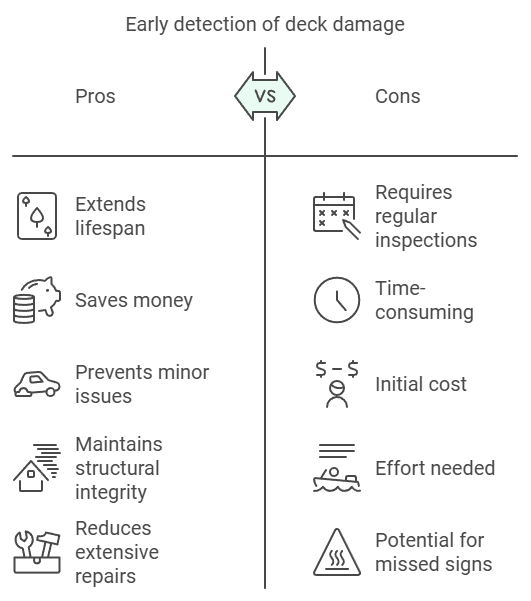
Common Signs of Deck Damage to Watch For
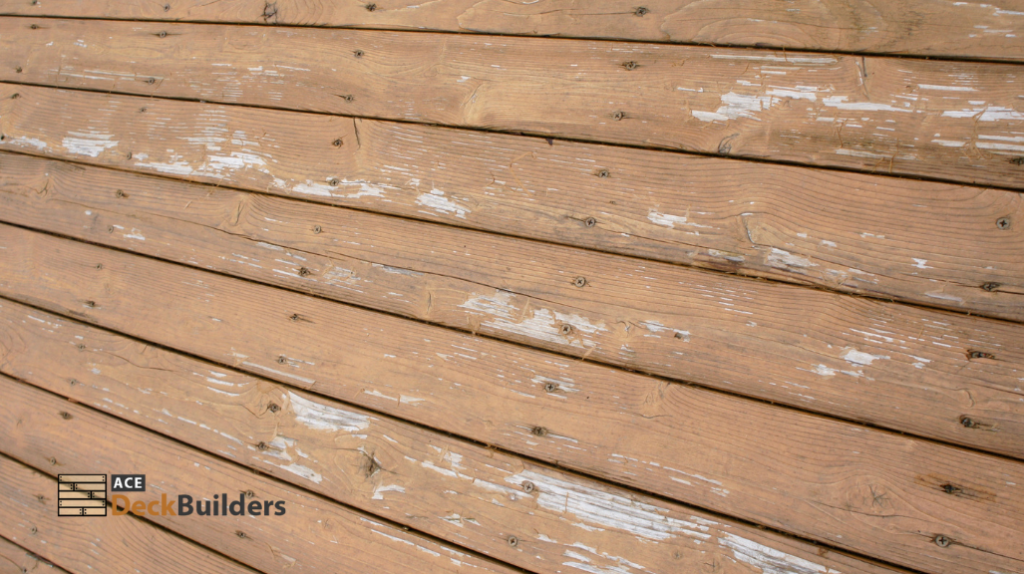
Understanding what to look for during a deck inspection can make all the difference. Homeowners should be aware that rotting wood is a common sign of deck damage. Here are some of the most common signs of damage to be aware of:
Loose or Wobbly Deck Railings
One of the primary indicators of deck damage is loose or unstable railings. This is often due to weakened connections caused by rusted fasteners, rot, or moisture exposure. Loose railings are a safety hazard, especially for decks at elevated heights. If your deck railings are shaky, addressing this issue promptly is essential to avoid accidents.
Cracked or Warped Deck Boards
Over time, wooden deck boards can crack, split, or warp due to exposure to the sun and moisture. Cracked boards are not only unsightly but can also become a tripping hazard or lead to further structural issues. Warping is especially common with wooden decks and indicates that the material is drying unevenly. Deck repair may involve replacing damaged boards to maintain the deck’s integrity and appearance.
Rusty or Corroded Fasteners
Fasteners like nails, screws, and brackets are critical to keeping your deck securely assembled. However, rusty or corroded fasteners can weaken over time, loosening the connections between the boards and the frame. During routine deck maintenance, check for signs of rust or corrosion, as these can affect the deck’s stability and safety.
Mold, Mildew, and Wood Rot
Mold and mildew growth on your deck surface is not only unsightly but can also indicate underlying moisture issues. In more severe cases, moisture exposure can lead to rotting wood, which compromises the strength of wooden structures. Inspect your deck for any soft or discolored spots, especially around the edges and underside. Wood rot requires immediate attention, as it spreads quickly and can weaken the deck’s support system.
Tip: Perform a thorough inspection after heavy rain or during high humidity seasons to catch any signs of mold or mildew early.
Sagging or Sinking Areas
If you notice any sagging or sinking areas on your deck, this may be a sign of issues with the foundation or support beams. If the damage is widespread, it may be necessary to replace the entire deck rather than opting for repairs. Soil movement, water pooling, or poor initial construction can cause deck parts to sink or sag over time. This problem can affect the deck’s stability and may require a professional deck inspection and repair to prevent further structural damage.
Preventive Measures to Protect Your Deck
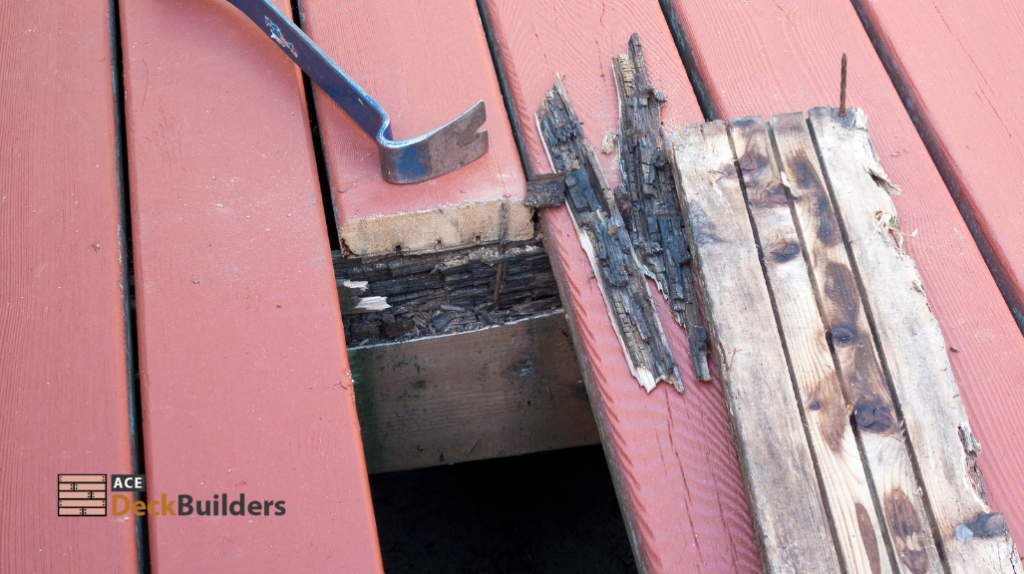
Preventive maintenance is vital to extending your deck’s lifespan and keeping it safe. Here are some effective strategies for deck maintenance:
Regular Cleaning
Regularly clean your deck to prevent dirt, debris, and moisture buildup. This can help reduce the chances of mold and mildew forming on the surface, particularly in shaded or humid areas. Sweep the deck to remove leaves and debris, and wash it with a mild cleaner suitable for your deck material.
Sealing and Staining
A sealant or stain protects a wooden deck against moisture and UV rays. Sealants help prevent water from seeping into the wood, reducing the risk of rot and warping. A UV-protective stain can prevent color fading and prolong the deck’s appearance.
Routine Inspections
Perform routine inspections, ideally in the spring and fall, to check for any signs of damage. Regular inspections help catch potential issues early, making deck repair more accessible and manageable. If you’re unsure about the extent of damage, a professional deck inspection can provide you with a thorough assessment.
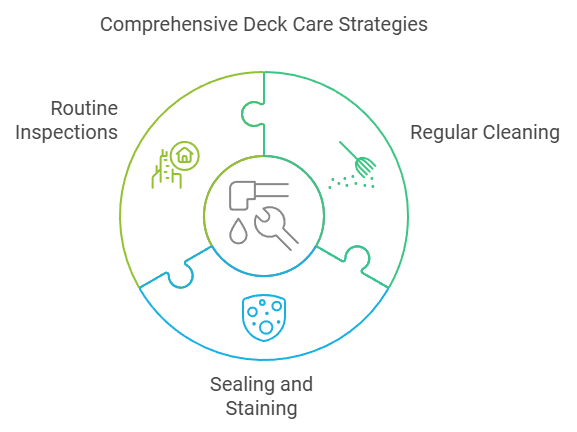
When to Contact a Professional Deck Company
While homeowners can manage minor repairs, significant issues or structural concerns require professional expertise. Here’s when it’s best to contact a professional deck contractor like Ace Deck Builders:
- Persistent Structural Issues: Professional intervention is essential to avoid accidents if your deck is sagging or has structural instability.
- Extensive Water Damage: Professionals need to address severe mold, mildew, or rot to prevent spreading.
- Outdated or Non-Compliant Decks: Older decks may not meet current safety standards. A professional can assess the deck’s condition and bring it up to code, ensuring your outdoor space is safe.
Related Blog: 5 Important Questions to Ask Before Hiring a Deck Contractor in Austin
The Benefits of Regular Deck Maintenance and Repair
Regular deck maintenance and repair enhance the deck’s appearance and improve its safety and longevity. Here are the key benefits:
- Enhanced Safety: Addressing loose boards, wobbly railings, and other issues keeps the deck safe for you and your family.
- Cost Savings: Minor repairs are generally more affordable than extensive overhauls. By taking preventive measures, you reduce the risk of costly replacements.
- Extended Deck Lifespan: A well-maintained deck can last for decades. Regular care and timely repairs keep the deck in optimal condition year after year, delaying the need for costly replacement.
Related Blog: The Importance of Proper Deck Installation: Avoiding Common Mistakes
Protect Your Investment with Timely Deck Repair
Identifying and addressing signs of deck damage early is essential to protecting your investment and maintaining a safe outdoor space. By conducting regular deck inspections and staying on top of deck maintenance, you can extend your deck’s lifespan and avoid costly repairs. At Ace Deck Builders, we’re dedicated to helping homeowners in Austin achieve safe, durable, and beautiful decks. If you’ve noticed any of these signs of damage or need a professional assessment, don’t hesitate to reach out.
Get a Free Estimate Today! Contact Ace Deck Builders for expert deck repair and maintenance services in Austin.
Frequently Asked Questions
What are common signs of deck damage?
The most common signs of deck damage include loose railings, cracked or warped boards, rusty fasteners, mold and mildew growth, and sagging or sinking areas. Regularly inspecting your deck for these issues can help you catch problems early and prevent more extensive damage.
How often should I inspect my deck?
It’s recommended to perform a deck inspection at least twice a year, ideally in spring and fall. Inspecting the deck after heavy weather, like storms or prolonged rainy periods, would be best to check for any new damage.
Can I repair my deck myself?
Minor repairs, such as tightening screws or cleaning mold, can be done by homeowners. However, structural issues like sagging, extensive water damage, or wood rot are best handled by a professional deck contractor to ensure safety and quality.
How can I prevent future deck damage?
To prevent future damage, conduct regular deck maintenance by cleaning, sealing, and inspecting the deck for wear. Applying a water-resistant sealant and addressing drainage issues can protect your deck from moisture damage, while routine inspections help catch any problems early.
What deck materials resist damage best?
Materials like composite decking and pressure-treated wood are famous for their durability and resistance to moisture and insects. These materials tend to last longer and require less maintenance than untreated wood, making them a good choice for long-lasting decks.
